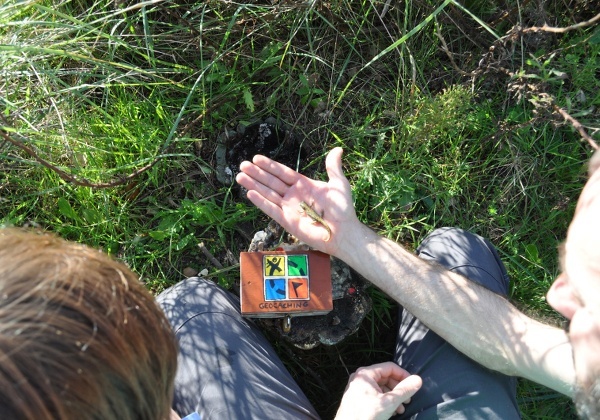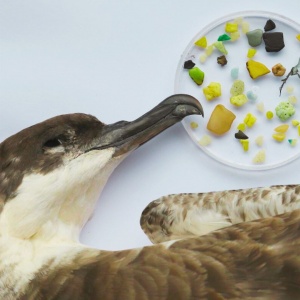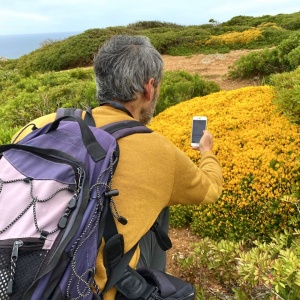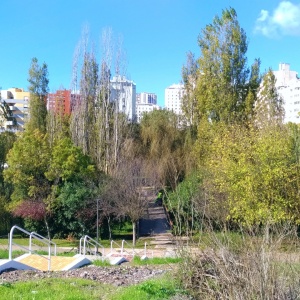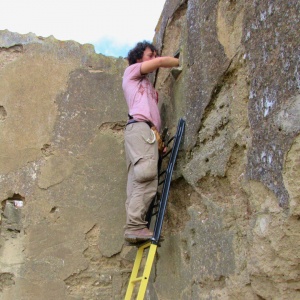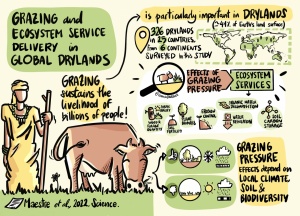5/02/2019. Text by Marta Daniela Santos. In the picture: Geocachers after finding the cache, and a pygmy marbled newt (Triturus pygmeus) that had hid underneath it. Photo by Inês Teixeira do Rosário.
Também disponível em português aqui.
In a new study now published in the Ecological Indicators journal, geocaching is used for the first time as an indicator for assessing cultural services provided by ecosystems: services that are difficult to measure, poorly studied, but fundamental in the process of defining effective management and conservation strategies.
There are many ways through which ecosystems contribute to human well-being. In addition to tangible resources and services – such as food, water and materials, among others – interaction with nature brings equally important non-material benefits. Recreation, cultural, spiritual and aesthetic enrichment – the so-called cultural services provided by ecosystems – leads to the establishment of strong emotional ties with the landscape. This cultural importance of ecosystems is difficult to assess and, therefore, poorly studied, but fundamental from the perspective of ecosystem conservation.
For the first time, a team of Portuguese researchers determined the preference for different landscapes using the geocaching database: the treasure hunting game in which its participants (geocachers) search for small containers or objects (caches) with the help of a GPS or a mobile phone. Once the cache is found, the participants log their activity on the official website, being able to write, add photos and assign a score to the treasure hunt experience. There are currently more than 5 million geocachers in the world, with over 3 million active caches hidden in 191 countries, on all continents.
“Our results for landscape preference in continental Portugal indicate that there is no a priori preference for any landscape type, when geocachers plan their visit – their main motivation is the adventure itself, also with a strong emphasis on respect for nature. However, geocachers’ stated preferences once they found the cache reveal that they prefer landscapes which are open or with water, followed by landscapes with forests”, explains Inês Teixeira do Rosário, postdoctoral researcher at the Centre for Ecology, Evolution and Environmental Changes – cE3c, at Faculty of Sciences of the University of Lisbon (Portugal), and first author of this study.
The forest landscape preferred by geocachers is montado, a multipurpose savannah-like landscape with scattered oaks. This unique agro-silvo-pastoral system, which resulted from millennia of traditional land use practices on the original Mediterranean woods, has high ecological and socio-economic value, and is being threatened by land use and climate change.
The largest cork-oak montado area in the world is found in southern Portugal, in the Alentejo region. “The production of cork, as well as food products traditional from Alentejo, are just two examples of derived products which are important not only economically but also culturally” explains Inês Teixeira do Rosário, adding: "Considering the difficulties that this ecosystem faces, such as tree mortality, it is also important to realize that there are other activities, such as nature-based recreation, compatible with existing ones that can help managers in their conservation”.
This is the first time that geocaching is used for this type of approach. And it was the fact that the geocaching database brings together not only photographs, but also texts and classifications attributed by geocachers, that led the researchers to explore this method to evaluate cultural services provided by ecosystems.
Through data collected in one of the main Portuguese geocaching forums (www.geopt.org), the researchers verified in which landscape types were located the more than 35 000 active caches in continental Portugal at the date of the study, by the end of 2016. They also calculated the frequency of cache visits, as well as the total number of photographs, and analyzed the votes and the length of the texts published by the participants after finding the caches, according to landscape type – which revealed the preference for open landscapes and for landscapes with water.
“These results show that several types of landscapes are important for those who enjoy outdoor activities, and that these activities should be taken into account in land-use planning and property management”, concludes Inês Teixeira do Rosário.
This study is a result of the collaboration between researchers from the Centre for Ecology, Evolution and Environmental Changes (Faculty of Sciences of the University of Lisbon), from the environmental consulting firm Bioinsight, from the Centre for Forest Studies (Instituto Superior de Agronomia – University of Lisbon) and the Interdisciplinary Centre for Social Sciences CICS.NOVA (New University of Lisbon).
Reference of the scientific article:
Rosário, I.T., Rebelo, R., Cardoso, P., segurado, P., Mendes, R.N. & Santos-Reis, M. (2019) Can geocaching be an indicator of cultural ecosystem services? The case of the montado savannah-like landscape. Ecological Indicators, 99, 375-386. DOI: 10.1016/j.ecolind.2018.12.003

